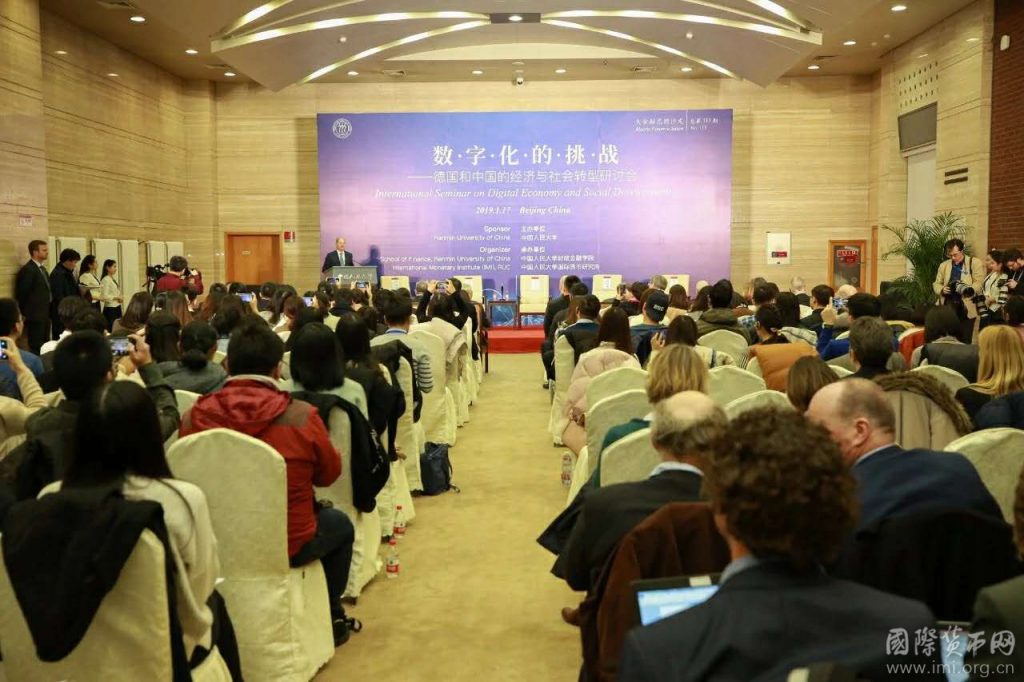Macro-Finance Salon (No. 113): The Challenge of Digitalization and Social Transformation in Germany and China
2019-01-17 IMI Zhang Jianming, Executive Vice Chairman of the University Council, Renmin University, gave a welcome address. Vice President Wu Xiaoqiu of Renmin University attended the roundtable discussion. Zhuang Yumin, Dean of School of Finance at RUC, chaired the meeting. IMI Co-Director Ben Shenglin moderated the panel discussion. More than 150 experts and scholars from Chinese and German businesses, research institutes, governments and media, including Hotnest co-founder Fabian von Heimburg, Mobvoi founder and CEO Li Zhifei, attended the meeting.
Zhang Jianming welcomed the arrival of Vice Chancellor Scholz and the delegation. He pointed out that Renmin University of China, as the first modern university founded by the Communist Party of China, plays an important role in social sciences in China. He noted that from its beginning, the Macro-Finance Salon has been following both China’s reality and international frontier. The salon has built a high-level professional exchange platform for broad financial disciplines in the new era and its theoretical researches. He hopes that the discussion would introduce new methods, new models and new forms of modern economic development in the integration of digital economy and social development, and also would contribute to the promotion of Sino-German friendship and economic and social development in China and Germany.
Zhang Jianming, Executive Vice Chairman of the University Council, Renmin University, gave a welcome address. Vice President Wu Xiaoqiu of Renmin University attended the roundtable discussion. Zhuang Yumin, Dean of School of Finance at RUC, chaired the meeting. IMI Co-Director Ben Shenglin moderated the panel discussion. More than 150 experts and scholars from Chinese and German businesses, research institutes, governments and media, including Hotnest co-founder Fabian von Heimburg, Mobvoi founder and CEO Li Zhifei, attended the meeting.
Zhang Jianming welcomed the arrival of Vice Chancellor Scholz and the delegation. He pointed out that Renmin University of China, as the first modern university founded by the Communist Party of China, plays an important role in social sciences in China. He noted that from its beginning, the Macro-Finance Salon has been following both China’s reality and international frontier. The salon has built a high-level professional exchange platform for broad financial disciplines in the new era and its theoretical researches. He hopes that the discussion would introduce new methods, new models and new forms of modern economic development in the integration of digital economy and social development, and also would contribute to the promotion of Sino-German friendship and economic and social development in China and Germany.
 In his speech, Mr. Olaf Scholz pointed out that young people should learn to cope with the challenges brought up by the digital economy. China and Germany are important trading partners and there are more links and communication between the two countries than ever. The digital economy is part of where the two sides can further cooperate. We must think of carefully the role of the digital economy in manufacture, energy and other industries, how to achieve equality, how to protect personal information in the development of the digital economy, and the role governments should play in digital economy. .
In his speech, Mr. Olaf Scholz pointed out that young people should learn to cope with the challenges brought up by the digital economy. China and Germany are important trading partners and there are more links and communication between the two countries than ever. The digital economy is part of where the two sides can further cooperate. We must think of carefully the role of the digital economy in manufacture, energy and other industries, how to achieve equality, how to protect personal information in the development of the digital economy, and the role governments should play in digital economy. .
 In the panel discussion, Olaf Scholz, Wu Xiaoqiu, Fabian von Heimburg, Li Zhifei and other guests discussed topics including the digital economy and social transformation.
In the panel discussion, Olaf Scholz, Wu Xiaoqiu, Fabian von Heimburg, Li Zhifei and other guests discussed topics including the digital economy and social transformation.

